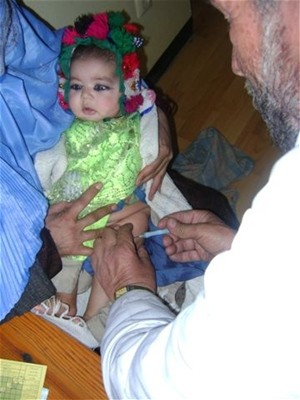
An Afghan doctor administers a vaccination to a baby girl in Farza District to protect her from communicable diseases.
USAID/BASICS
USAID seeks to improve the health of Afghan children through its Expanded Program on Immunization
29 AUGUST 2011 | KABUL, AFGHANISTAN
Routine vaccinations can spare many Afghan children from the communicable diseases that not only make them ill but can even cause death. But with 80 percent of the estimated 25 million people living in rural areas, in a country the size of Texas, immunizing every child against measles, diphtheria, whooping cough, tetanus and polio represents no small challenge.
While vaccination campaigns have made some progress, immunization rates across the country remain low. USAID is working to change that. Together with the Afghan Ministry of Public Health and UNICEF, USAID is piloting an Expanded Program on Immunization (EPI) micro-planning project in health facilities in nine provinces.
EPI micro-planning is a bottom-up approach in which local communities review immunization rates, identify why families do not have their children vaccinated, and tailor solutions appropriate to the local situation. This ensures the maximum number of children is present for vaccinations when sessions are organized.
Outreach clinics, where vaccinators travel to remote areas, are an important part of the program, accounting for 53 percent of children immunized. As head of a local community health council in Takhar province, Sedquddin plays an important role in organizing outreach services. "Because it is difficult for many families to bring their children to the clinic for shots, we are working with the clinic staff and vaccinators to develop schedules for outreach and mobile clinics to reach more children in remote areas," he said.
USAID works closely with Afghan Ministry of Public Health to overcome one of the more enduring barriers to providing better health for Afghan children. Dr. Mashal, director general of the Preventive Medicine Directorate, said, "With EPI micro-planning, we are showing that the real solution for greater vaccination rates is to combine local area monitoring with active community involvement and support from the health clinic staff. As a result, we will save more children from infectious diseases."







Comment
Make a general inquiry or suggest an improvement.